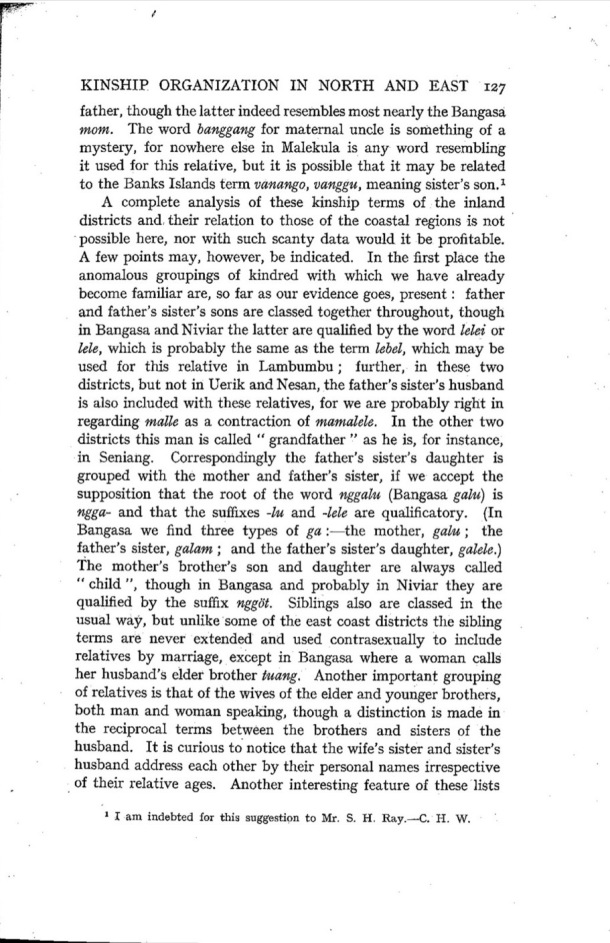|
|  [Note: this transcription was produced by an automatic OCR engine]
KINSHIP ORGANIZATION IN NORTH AND EAST I27
father. though the latter indeed resembles most nearly the Bangasa
mom. The word banggang for maternal uncle is somefliing of a
mystery, for nowhere else in Malekula is any word resembling
it used for this relative, but it is possible that it may be related
to the Banks Islands term wmangn, mmggu, meaning sister's son.‘
A complete analysis of these kinship terms of the inland
districts and. their relation to those of the coastal regions is not
possible here, nor with such scanty data would it be proï¬Åtable.
A tew points may, however, be indicated. In the ï¬Årst place the
anomalous groupings of kindred with which we have already
become familiar are, so tar as our evidence goes, present I father
and father's sister's sons are classed together throughout, though
in Bangasa and Niviar the latter are qualiï¬Åed by the word lelei or
lele, which is probably the same as the term label, which may be
used for this relative in Lambumbu ; further, in these two
districts, but not in Uerik and Nesan, the father's sister's husband
is also included with these relativm, for we are probably right in
regarding malle as a contraction of mamalzlei In the other two
districts this man is called " grandfather " as he is, for instance,
in Seniang. Correspondingly the father's sister's daughter is
grouped with the mother and father's sister, it we accept the
supposition that the root of the word nggalu (Bangasa gala) is
ngga- and that the suiï¬Åxes -lu and ~l:le are qualiï¬Åcatory. (In
Bangasa we ï¬Ånd three types of ga:~the mother, galu; the
father's sister, galam ; and the father's sister's daughter, galele.)
The mother's brother's son and daughter are always called
"child", though in Bangasa and probably in Niviar they are
qualiï¬Åed by the suffix nggm. Siblings also are classed in the
usual way, but unlike some of the east coast districts the sibling
terms are never extended and used contrasexually to include
relatives by marriage, except in Bangasa. where a woman calls
her husband's elder brother twang. Another important grouping
of relatives is that of the wives oi the elder and younger brothers,
both man and woman speaking, though a distinction is made in
the reciprocal terms between the brothers and sisters of the
husband. It is curious to notice that the wife's sister and sister’s
husband address each other by their personal names irrespective
of their relative ages. Another interesting feature of these lists
7' I am indebted for this suggestion to Mr. S. I-I. Ray.—C. H. W.
L
|